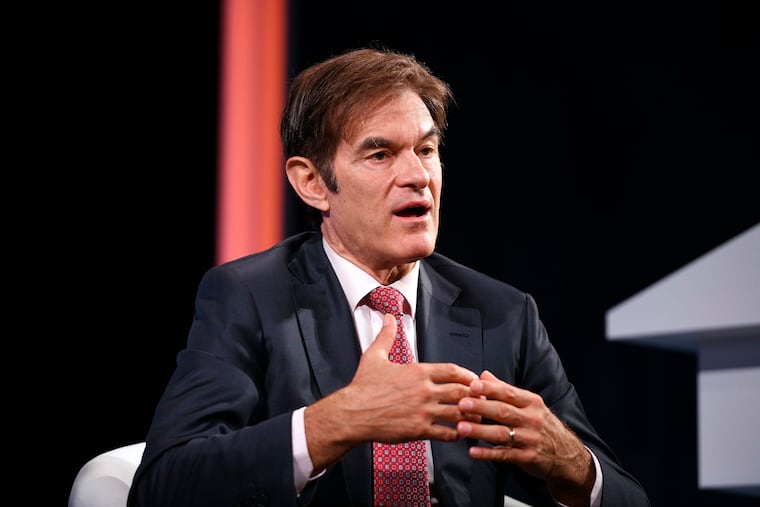Two little letters that could skew the Pa. Senate race | The Grammarian
Dr. Mehmet Oz might be disappointed to learn that some news sites will not be using his honorific during his political campaign.

A year ago this week, a Mr. Joseph Epstein ignited a firestorm with his baldly misogynistic Wall Street Journal commentary suggesting that Dr. Jill Biden, then our first-lady-elect, drop the Dr.
While referring to the most highly educated first lady in our country’s history as “kiddo,” Epstein suggested only medical doctors should go by Dr., saying that in her case, the title “feels fraudulent.” Tucker Carlson, sad that he didn’t come up with this inane controversy himself, piled on, as did other conservative pundits.
Last week, the shoe found its other foot.
As conservatives cheered celebrity doctor and maybe-New-Jerseyan Mehmet Oz’s entering the race to represent Pennsylvania in the U.S. Senate, publications were inconsistent on whether they referred to him as Dr. Oz, as he’s known on his TV show, or just Oz.
The Associated Press: “Celebrity surgeon Dr. Oz running for Senate in Pennsylvania.”
The Washington Post: “Celebrity doctor Mehmet Oz announces Senate run in Pennsylvania, joins GOP field.”
» READ MORE: Dr. Oz officially joins the Senate race in Pennsylvania
The day after Oz announced his candidacy, The Inquirer’s front-page headline, photo caption, and first sentence all referred to Dr. Oz. That goes against the paper’s style guide, which reads: “Do not use Dr. on first reference for anyone with the title, whether they are a medical doctor or have a doctorate in a nonmedical field, to avoid complaints of unequal treatment from individuals who worked hard to achieve doctorates in nonmedical fields.” It specifies just two exceptions: obituaries, and the Rev. Dr. Martin Luther King Jr.
Dr. J is gonna be mad.
The New York Times’ guidance is even more convoluted. Unlike most other newspapers, the Times uses honorifics like Dr., Ms., and Mr. in all stories except its pop-culture coverage. But Oz — despite being primarily a pop-culture doctor with his own TV show since 2009 — was called Dr. Oz in the headline of the Times’ coverage.
It all raises a crucial question: When is an honorific also a brand, and when can that brand stand without the honorific?
These couple of little letters are a big deal, as they bestow status, authority, and honor (hence the term honorific). In an overcrowded electoral field, anything that makes a candidate stand out can produce dividends. Occasionally honorifics are helpful in distinguishing between multiple members of the same family who have the same last name, but with only one other Oz prominent in popular culture, it was unlikely that readers would confuse the celebrity doctor/Senate candidate with the Wizard.
After The Inquirer ran Dr. in its headline, the paper’s style committee determined that doing so was the wrong call. After all, Val Arkoosh, a Democratic candidate for U.S. Senate in Pennsylvania, is also both a medical doctor and a celebrity (of sorts, as Montgomery County commissioner, albeit not the one who drew protesters to his home for calling Black Lives Matter a hate group), and yet the paper doesn’t refer to her as Dr. Arkoosh in headlines.
Going forward, The Inquirer determined that it will refer to all candidates in the same way, which means that while Oz may be referenced as a celebrity doctor, Dr. Oz will be limited to mentions of his TV show … which is now off the air in Philly.
The doctor might be disappointed. If the Senate thing doesn’t work out for him, maybe he should learn to dunk.
The Grammarian, otherwise known as Jeffrey Barg, looks at how language, grammar, and punctuation shape our world, and appears biweekly. Send comments, questions, and weakened roots to jeff@theangrygrammarian.com.
Read more from The Grammarian
One word that might’ve convicted Kyle Rittenhouse
Will ‘meta’ suffer the same fate as ‘uber-’ and ‘face book’? An investigation of branded words.
Biden’s ‘I’ll be darned’ packs a bigger punch than Trump’s F-bombs